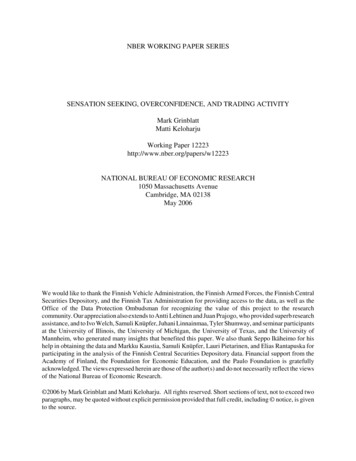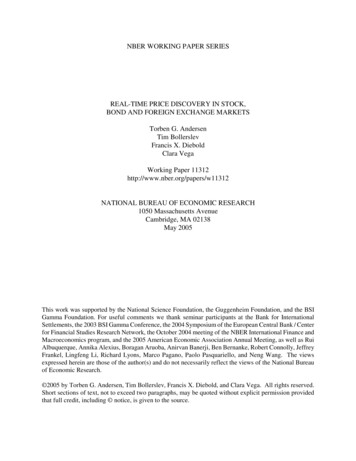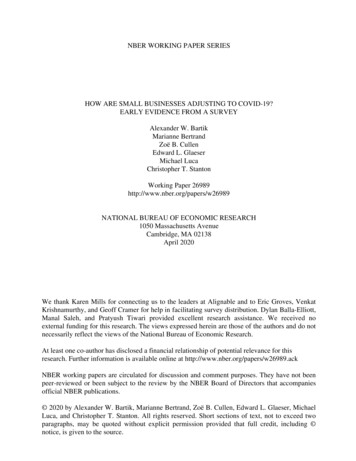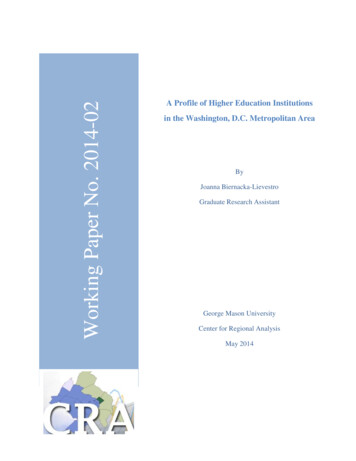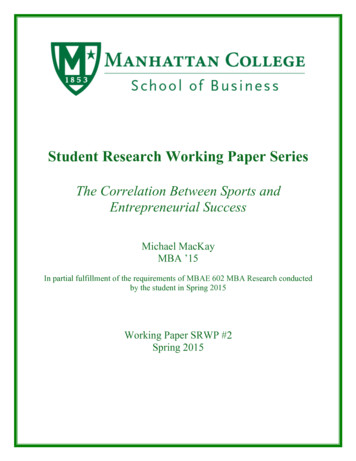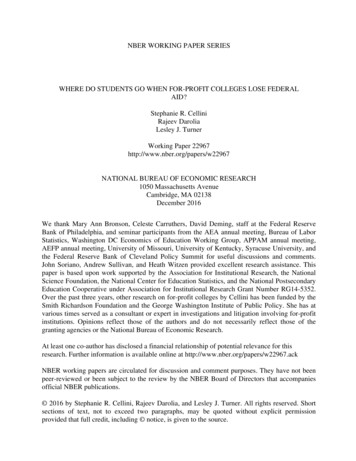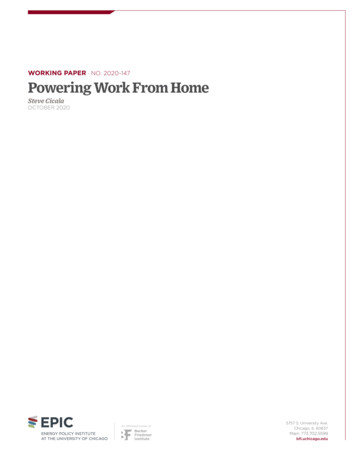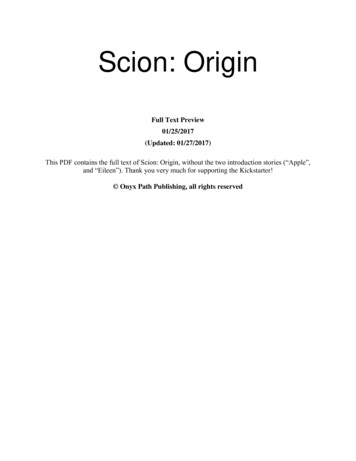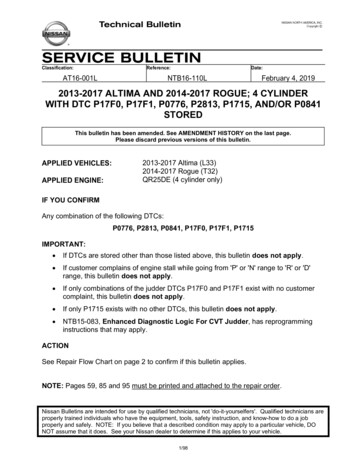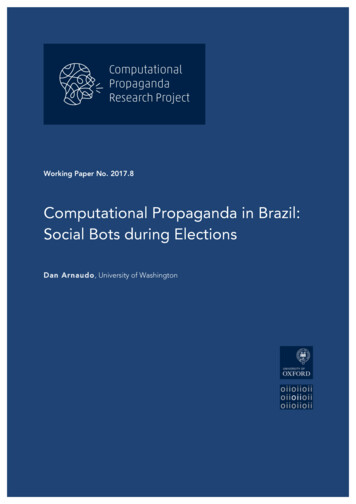
Transcription
Working Paper No. 2017.8Computational Propaganda in Brazil:Social Bots during ElectionsDan Arnaudo, University of Washington1
Table of ContentsAbstract . 3Introduction . 3Setting the scene: A turbulent but vibrant political system reflected online . 7Bots enter a presidential debate . 12Impeachment and the electronic campaign that never ended . 16The 2016 Rio de Janeiro municipal elections . 19Conclusion: Responses and emerging trends . 26References. 27Citation. 38Series Acknowledgements . 38Table of TablesTable 1: Bot created by UFMG . 21Table 2: Hashtags collected from February 27 to March 27, 2017 . 22Table 3: Hashtags collected from May 1 to May 14, 2017 . 22Table 4: Six top accounts by number of tweets captured . 232
AbstractComputational propaganda can take the form of automated accounts (bots)spreading information, algorithmic manipulation and the spread of fake news toshape public opinion, amongst other methods. These techniques are being used incombination with the analysis and usage of large data sets of information aboutcitizens held by corporations and governments. This form of propaganda isspreading to countries all over the world, most notably during the 2016 USpresidential elections and the run-up to the UK’s referendum to leave the EuropeanUnion (Brexit). This working paper examines the use of computational propagandain Brazil, the largest country in Latin America and a critical part of the globalinternet. This examination takes the form of the study of three recent cases of theuse of computational propaganda in Brazil: the 2014 presidential elections, theimpeachment of former president Dilma Rousseff and the 2016 municipal electionsin Rio de Janeiro. It examines the legal framework governing the internet and theelectoral process online, particularly how this process relates to computationalpropaganda. In addition, it seeks to understand how bots are involved inmultifarious economic and political themes, and in ongoing debates in the countryabout corruption, privatization, and social and economic reform. Through acollection and analysis of hashtags related to major investigations into corruption inpolitics, as well as to proposed reforms to the social support systems and protestsrelated to them, the working paper identifies bots that are involved in thesedebates and how they operate. Finally, it looks at potential responses to this kind ofpropaganda, from legal, technical and organizational perspectives, as well as atsome indications of future trends in the use of these techniques in Brazilian societyand politics.IntroductionAs the internet grows exponentially in size and scope, so does the impact it has onour everyday activities, from our communications to market exchange toparticipation in political systems. It is changing political discourse throughout theworld, while simultaneously the computational systems and the networks thatconnect them are playing an integral role in shaping elections and debates. The2016 presidential elections in the United States (Kollanyi, Howard, & Woolley, 2016)and the United Kingdom’s vote to leave the European Union (Howard & Kollanyi,2016) offer two prime examples. In both cases, evidence shows that computercontrolled accounts, or bots, often promoted false or inaccurate information, andplayed an integral part in propagating information about candidates and campaignsonline.3
The US government found that Russian state-sponsored computational propagandaplayed an instrumental role in the 2016 presidential election (U.S. Office of theDirector of National Intelligence, 2017), a conclusion that Facebook said its data didnot contradict (Weedon, Nuland, & Stamos, 2017). Massive networks of automatedaccounts, also known as botnets, can be built to manipulate algorithms in majorsocial networks such as Facebook, Twitter and YouTube and can drive users tocontent supporting or attacking candidates and issues.However, while these examples provide the most well-known, globally influentialaccounts of how computational propaganda operates in the twenty-first century,they are not the only types of situations where these techniques are being used.Across the developing world and the Global South, political actors are operatingusing the same kind of botnets and a wide range of propagandistic tactics online,from the use of large data sets of information about voters to algorithmicmanipulation. As the largest national economy, population and territory in LatinAmerica, Brazil is a critical case that can be used to study how these systems andactors operate in a relatively young, developing democracy.The world’s fifth largest populace also dominates the internet in the westernhemisphere in a way only surpassed by the United States. It controls much of thebackbone network infrastructure of South America, including transatlantic fibre opticcables, international interconnections, Internet Exchange Points and data centres(Arnaudo, 2017). This extends to critical internet resources such as Domain NameSystems, IP addresses, Autonomous System Numbers and other measures of onlineinfluence (DeNardis, 2013). It also wields considerable international influence invirtual and physical space as a member of the BRICS group of developing nationsand a leader in the Global South. The company that used big data and themanipulation of social network algorithms to promote the Trump (Cadwalladr,2017a) and Brexit (Cadwalladr, 2017b) campaigns, Cambridge Analytics, hasrecently bet on Brazil by opening an office in São Paulo (Brigatto, 2017). Clearly,Latin America’s biggest democracy is a huge growth market for internationalpolitical consultancy.However, it is also mired in long-standing, deeply intertwined political andeconomic crises. Years of a sprawling corruption scandal known as Car Wash (LavoJato in Portuguese) has hobbled the political class, leading to many arrests,investigations and resignations throughout the government. Consecutive years of4
recession have tarnished the legacy of the Workers’ Party (Partido dos Trabaladores,or PT) that ruled the country from 2002 to 2016 under former presidents LulaIgnacio de Silva (Lula) and Dilma Rousseff (Dilma). Lula is under investigation forcorruption as part of the Lava Jato scheme. While his successor Dilma is not, shewas impeached in 2016 and removed from office, supposedly for manipulatinggovernment accounts in the run-up to her 2014 re-election. She and her supportershave suggested that her former allies in coalition, now opposition, impeached herbecause they wanted to stymie the Lava Jato investigation and take power forthemselves.The new government, led by Dilma’s former vice president and erstwhile ally MichelTemer, has not stopped the disastrous economic decline or the Lava Jatoinvestigation, which has claimed several of his ministers, allies in Congress andbureaucrats throughout the government. President Temer ran as Dilma’s vicepresident in the 2014 election when his Partido Movimento Democratico Brasileiro(PMDB, or Brazilian Democratic Movement Party) aligned with her Workers’ Party ina coalition. This coalition broke up soon after the election, and Temer and his partywere thereafter instrumental in her impeachment.This volatile political environment provides a large, rich and dynamic field for thestudy of computational propaganda. Parties to various electoral contests in recentyears have made increasing use of social networks and the internet in general toorganize campaigns and promote their candidates or any given issue, whileattacking others (Buckstegge & Stabile, 2016). Simultaneously, in this period Brazilhas rapidly adopted social networks as the existing media environment has rapidlyshifted. John Perry Barlow, a founder of the Electronic Frontier Foundation,described the situation as follows: “Brazil is an enormous inside joke, and theinternet is a mass conversation. Brazil was the Internet before the Internet existed.”Barlow distributed all 100 of his early invitations to Google’s pioneering socialnetwork Orkut to Brazilians, leading to rapid adoption and the largest user base inthe world. It remained the largest social network in Brazil until it was overtaken byFacebook in 2014 (Ruvolo, 2014).This widespread, intense online participation extends to the democratic processitself. The internet and social networks have become instrumental in spreadinginformation about candidates, following news and debates and tracking issuesranging from corruption to pension reform. This same energy contributed to the5
creation of a digital bill of rights within the country’s constitution that now forms thecore of laws governing Brazilian cyberspace, created through an open source,online, creative commons system that crowdsourced the process of drafting the textof the bill. This law, known as the Marco Civil da Internet, or the Internet Bill ofRights, became a model for internet governance for countries around the world(O’Maley, 2015). It provides strong privacy guarantees for all citizens and situatesprinciples such as network neutrality, universal internet access and freedom ofexpression online in the constitution.Simultaneously, this vibrancy is overshadowed by instability in the economy,corruption and deep political uncertainty. Computational propaganda in forms suchas bot networks, fake news and algorithmic manipulation play key roles in thepolitical system in Latin America’s largest democracy. What roles did computationalpropaganda play in the elections that have shaped modern Brazil, particularly thepresidential election of 2014 and the local elections in 2016? How did its usersattempt to shape discourse during the impeachment process that ended over adecade of control by the Worker’s Party? Does this form of propaganda play anyrole in shaping ongoing debates about corruption investigations, social reforms andother issues that transcend singular events? How does the legal system, buttressedby the Marco Civil, respond to this kind of propaganda? Are the laws, the mediaand other actors structured in a way that can monitor these challenges to open,democratic discourse in the networked public sphere (Benkler, 2006) and respondto them?To begin to answer these questions, this working paper will examine computationalpropaganda found during three specific political events that engendered intensepolitical debate: the presidential election in 2014, the local elections in 2016 andthe impeachment of former president Rousseff in the same year. Secondly, it willattempt to examine underlying, ongoing political issues that have been consistentlydebated and discussed in society and online throughout this period: corruption inthe form of the Lava Jato investigation, social change in terms of the reform of thepension and education systems, and the economic system at the heart of many ofthese debates. Besides evaluating academic literature tracking these events andissues, it will examine the media systems in which they are situated and how theyportray the role of this kind of computational propaganda in society as well as thelaws that attempt to govern virtual space.6
Interviews with political consultants, academics, journalists and technologists willprovide further background information on aspects of how bots and other forms ofmanipulation work online. Data sets of tweets linked to underlying political issuesprovide examples of how computers, individually and collectively, are contributingto online discourse. Bots that are identified in the collection will be examined interms of their content, links, followers and network to show examples of how theseautonomous agents operate online. Finally, this working paper will offer somethoughts on how this propaganda could shape the political debates of Brazil’sfuture based on this discussion and data.Setting the scene: A turbulent but vibrant politicalsystem reflected onlineAs described earlier, Brazil is a centre of raging political debates about the best wayforward for a rapidly developing society as its economy sags under the strain of adeep recession. As the country hosted the World Cup in 2014 and the Olympics in2016, the economy stalled and shrank, leading to rising unemployment and attackson the leading Workers’ Party, which had held power under Presidents Lula andRousseff since 2002 (“GDP per capita growth (annual %),” 2017). In over a decadein power, the centre-left party had pushed for policies that supported large-scalesocial programmes such as the Bolsa Familia, which provided subsidies to poorfamilies to buy food and other necessities. It was generally supported by anupswing in economic fortunes, which was bolstered by a commodity boom that fedmarkets across Latin America, Africa and Asia.The political system is fragmented. In 2014, the number of political parties inCongress grew from 23 to 28, one of the highest numbers in the world.Governments must work in a coalition of many, which has always made for anun
as bot networks, fake news and algorithmic manipulation play key roles in the political system in Latin America’s largest democracy. What roles did computational propaganda play in the elections that have shaped modern Brazil, particularly the presidential election of
